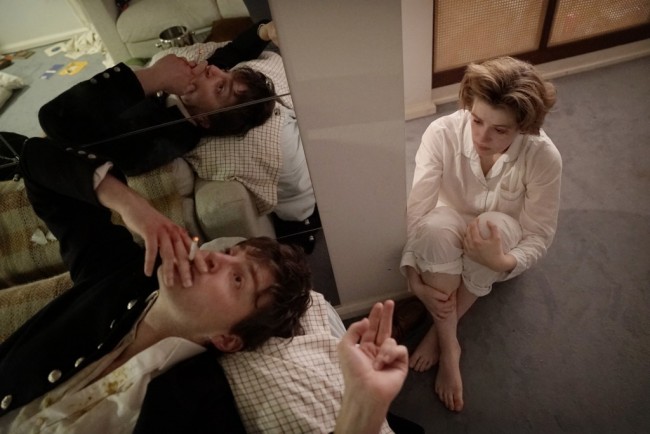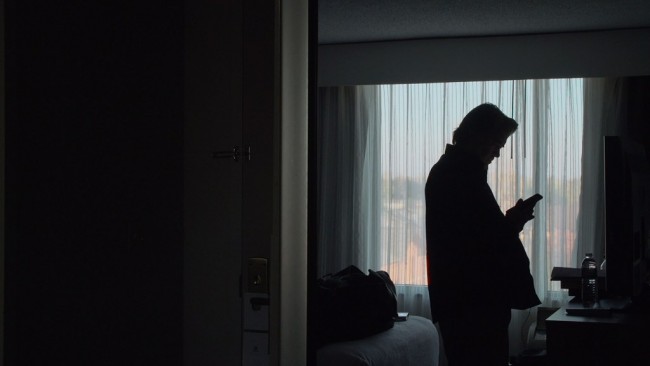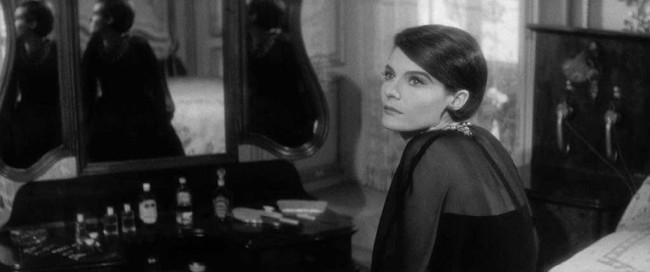Movie City Indie Archive for May, 2019
Friday Movies: ROCKETMAN, THE SOUVENIR, LAST YEAR AT MARIENBAD,THE BRINK

Rocketman. Rocketman, the biopic-jukebox musical strung upon the outpouring of songs written by Elton John and Bernie Taupin, is saved from its chock-a-block narrative impatience by the pure puppy-ness of Taron Egerton’s performance as Reg Dwight grown big and awful, rocketing toward his present twenty-eight years of sobriety. Camp is indicated more than embodied: the phantasm of Elton John’s feelings, both sad and flying high, plays as a deracinated version of a Baz Luhrmann canvas like Moulin Rouge than the Ken Russell bacchanal that would have incinerated the screen. (The script is by Lee Hall, who collaborated with John on the stage musical adaptation of his highly political Billy Elliot screenplay.) [More here.]
 The Souvenir. Joanna Hogg’s The Souvenir is as mysterious as it is specific, tracing the drift of Julie, an intensely ambitious film student (Honor Swinton Byrne) who is distracted by a first true love affair, with Anthony (Tom Burke), a man who appears to take her seriously indeed. Set in the 1980s artistic era in which the writer-director grew up, Hogg’s fourth feature describes how a film narrative can flow around the range of thoughts and emotions that a shy young woman holds as she hopes to make art. Places and faces are equally expressive realms. Can imagination be mere delusion? What are her dreams? Hogg dreamt them, dreams them, again, as distanced onscreen memoir, and the dream is furthered by Byrne’s mesmerizing, fleeting performance. “Making the film, I’m allowing parts of my own biography to be re-imagined and expanded upon and changed,” Hogg has said. “I want it to become something else.” [More here.]
The Souvenir. Joanna Hogg’s The Souvenir is as mysterious as it is specific, tracing the drift of Julie, an intensely ambitious film student (Honor Swinton Byrne) who is distracted by a first true love affair, with Anthony (Tom Burke), a man who appears to take her seriously indeed. Set in the 1980s artistic era in which the writer-director grew up, Hogg’s fourth feature describes how a film narrative can flow around the range of thoughts and emotions that a shy young woman holds as she hopes to make art. Places and faces are equally expressive realms. Can imagination be mere delusion? What are her dreams? Hogg dreamt them, dreams them, again, as distanced onscreen memoir, and the dream is furthered by Byrne’s mesmerizing, fleeting performance. “Making the film, I’m allowing parts of my own biography to be re-imagined and expanded upon and changed,” Hogg has said. “I want it to become something else.” [More here.]
 The Brink. Alison Klayman’s The Brink, an avatar of cinema-vérité observation, arrives in a hush and escalates with precision. Klayman records political consultant and purported intellectual powerhouse Stephen K. “Steve” Bannon after his dismissal from the arms of Trump power, and the rich result, captured by a filmmaker-cinematographer-sound recordist on their own, all on their own, is edited to a fierce ninety-minute form from day-after-day of close observation of a year in a life of wheeling and huffing and dealing and puffing. [More here.] iTunes, June 4.
The Brink. Alison Klayman’s The Brink, an avatar of cinema-vérité observation, arrives in a hush and escalates with precision. Klayman records political consultant and purported intellectual powerhouse Stephen K. “Steve” Bannon after his dismissal from the arms of Trump power, and the rich result, captured by a filmmaker-cinematographer-sound recordist on their own, all on their own, is edited to a fierce ninety-minute form from day-after-day of close observation of a year in a life of wheeling and huffing and dealing and puffing. [More here.] iTunes, June 4.
Last Year At Marienbad. [4k restoration; Criterion Blu upgrade.] Furiously beautiful and fatefully unforgettable, Alain Resnais’ Last Year at Marienbad (L’année dernière à Marienbad), released in 1961 and written by Alain Robbe-Grillet in an absurdly detailed screenplay, is of its time. Its greatness lies in being a riotous puzzle box with silken and sheer and shiny surfaces that should dazzle, somewhat comforting in their concreteness as figures and objects, but discomfiture of memory and time and dream in its very form. A fantastic world of impossible wealth and improbable ennui and sculptured hair and Coco Chanel couture tacking through castle and courtyard in the shapeliest but least-definable of waking dreams: it is a thundercrack. (Robbe-Grillet said he was describing “a purely mental space and time—those of dreams, perhaps, or of memory, those of any affective life—without worrying too much about the traditional relations of cause and effect, or about an absolute time sequence in the narrative.”) [More here.]












